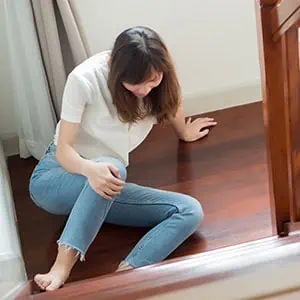 This type of accident is usually caused by foreign substances on floors of supermarkets, but these cases are very difficult to win. The legislature has passed statutes saying you have to prove that there was an unreasonably dangerous condition and the store owner had to have actual knowledge of it or reasonable knowledge of it, meaning it had to be there for such a long period of time that, surely, they knew about it. That’s very difficult to prove.
This type of accident is usually caused by foreign substances on floors of supermarkets, but these cases are very difficult to win. The legislature has passed statutes saying you have to prove that there was an unreasonably dangerous condition and the store owner had to have actual knowledge of it or reasonable knowledge of it, meaning it had to be there for such a long period of time that, surely, they knew about it. That’s very difficult to prove.
However, there are plenty of successful premise cases. I handled one not long against a local municipality. There was a terrible spot in the sidewalk in front of a beauty salon, and the lady who owned the beauty salon called and reported it a number of times and had even written letters. One of her clients comes in and falls face down, breaking her wrists and busting up her face. It was very easy for us to prove knowledge. They knew all about it and didn’t do anything. The most difficult element was knowledge of the defect. After that, it was just a question of damages, and they paid quite a bit.
What Types Of Injuries Do You Commonly See In These Types Of Cases?
In slip and trip accidents, we often see facial, jaw, or wrist injuries if they fall face forward. Slipping backward usually means a blow to the back of the head, some disc injuries, lower back injuries, cracked ribs, that sort of thing. It can be a substantial injury depending on the severity of the impact.
What Happens If I Slip And Fall On An Obvious Hazard That A Reasonable Person Would Have Avoided?
It certainly would impact your case if you’re injured due to something open and obvious. If you saw it and encountered it anyway, then you’d probably be 100% at fault in a situation like that. To give an example, if you see a puddle in a grocery store and try to jump over it or walk through it, that’s your problem.
Nevertheless, you have to appreciate the dangerousness of the situation. I’m handling a case where a guy was high up in the rafters at a coliseum. He was changing something or other but dropped one of his tools. When he reached down to get it, he perceived there to be solid floor, but it wasn’t. It was a suspended ceiling but not the kind of suspended ceiling you are used to seeing with 3 x 2 panels. He stepped on it and went through it. The other side is claiming the danger of the panel was open and obvious, and we are saying it wasn’t because you could not tell that it wasn’t a solid surface. Open and obvious only applies when a reasonable mind would say, “This is clearly a problem. Stay away from it.”
If My Slip And Fall Occurred On Public Property, Could I Sue? Who Would Be Liable?
You could sue. The last case I had involved a city sidewalk. The same law applies to the state or the city as it does to a private location.
For more information on Premises Liability Injury Claims in Louisiana, an initial consultation is your next best step. Get the information and legal answers you are seeking by calling (985) 200-8466 today.

Call For A Free Consultation
(985) 200-8466

